Healthcare Accreditation: Roles of Bodies, Outsourcing, and Evaluation
VerifiedAdded on 2023/01/23
|5
|906
|44
Report
AI Summary
This report delves into the multifaceted world of healthcare accreditation, exploring the roles and responsibilities of accrediting bodies in maintaining and improving healthcare quality. It examines the interplay between government and other entities in managing accreditation standards, considering factors that policymakers should weigh when deciding whether to outsource accreditation to private bodies. The report further discusses evaluation methods for outsourced accreditation, ensuring accountability and effectiveness. It also analyzes the potential impact of accreditation on key stakeholders within the healthcare sector, including costs, time commitments, and the need for continuous improvement. The report draws upon existing literature to support its arguments, providing a comprehensive overview of the subject.
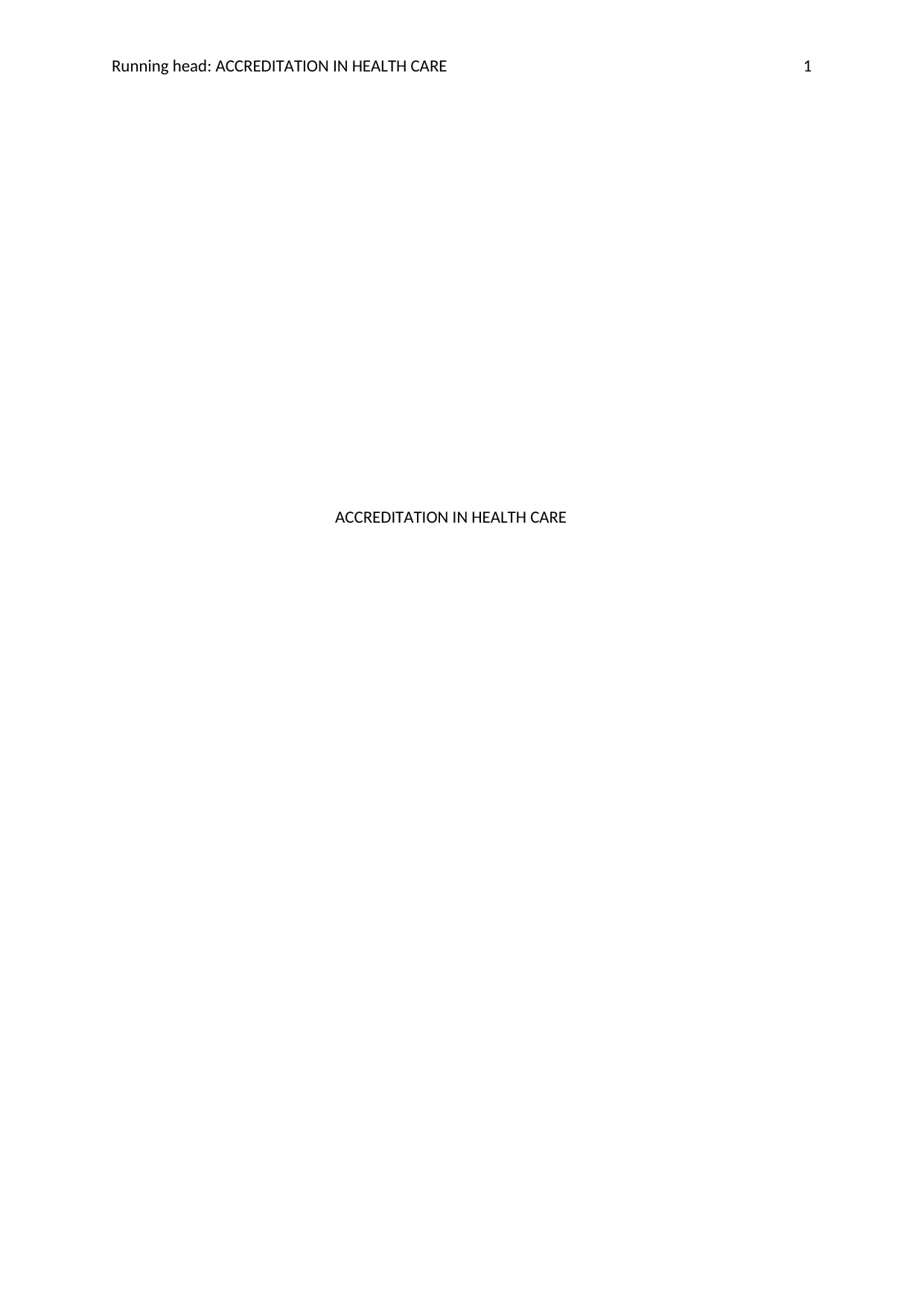
Running head: ACCREDITATION IN HEALTH CARE 1
ACCREDITATION IN HEALTH CARE
ACCREDITATION IN HEALTH CARE
Paraphrase This Document
Need a fresh take? Get an instant paraphrase of this document with our AI Paraphraser
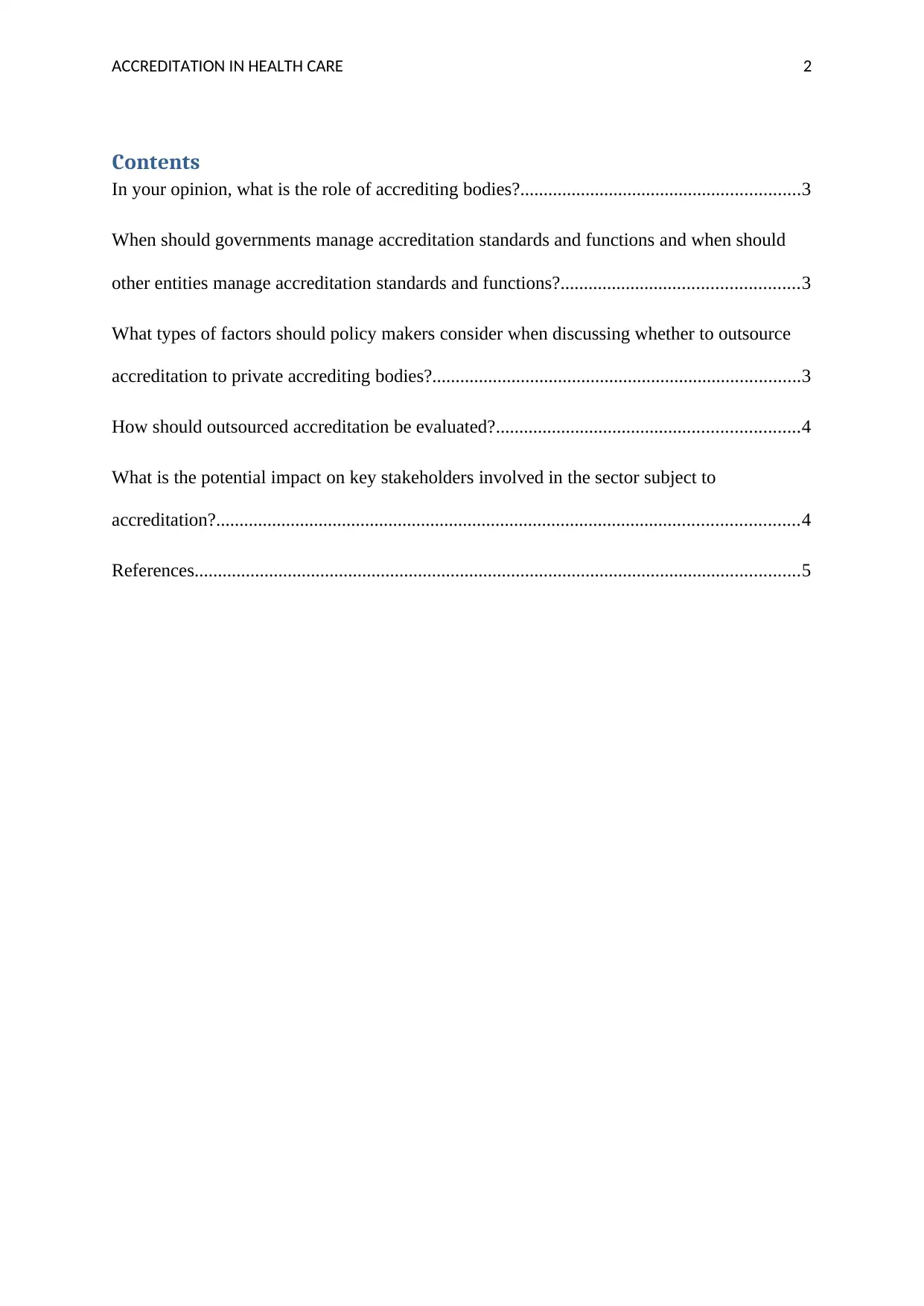
ACCREDITATION IN HEALTH CARE 2
Contents
In your opinion, what is the role of accrediting bodies?............................................................3
When should governments manage accreditation standards and functions and when should
other entities manage accreditation standards and functions?...................................................3
What types of factors should policy makers consider when discussing whether to outsource
accreditation to private accrediting bodies?...............................................................................3
How should outsourced accreditation be evaluated?.................................................................4
What is the potential impact on key stakeholders involved in the sector subject to
accreditation?.............................................................................................................................4
References..................................................................................................................................5
Contents
In your opinion, what is the role of accrediting bodies?............................................................3
When should governments manage accreditation standards and functions and when should
other entities manage accreditation standards and functions?...................................................3
What types of factors should policy makers consider when discussing whether to outsource
accreditation to private accrediting bodies?...............................................................................3
How should outsourced accreditation be evaluated?.................................................................4
What is the potential impact on key stakeholders involved in the sector subject to
accreditation?.............................................................................................................................4
References..................................................................................................................................5
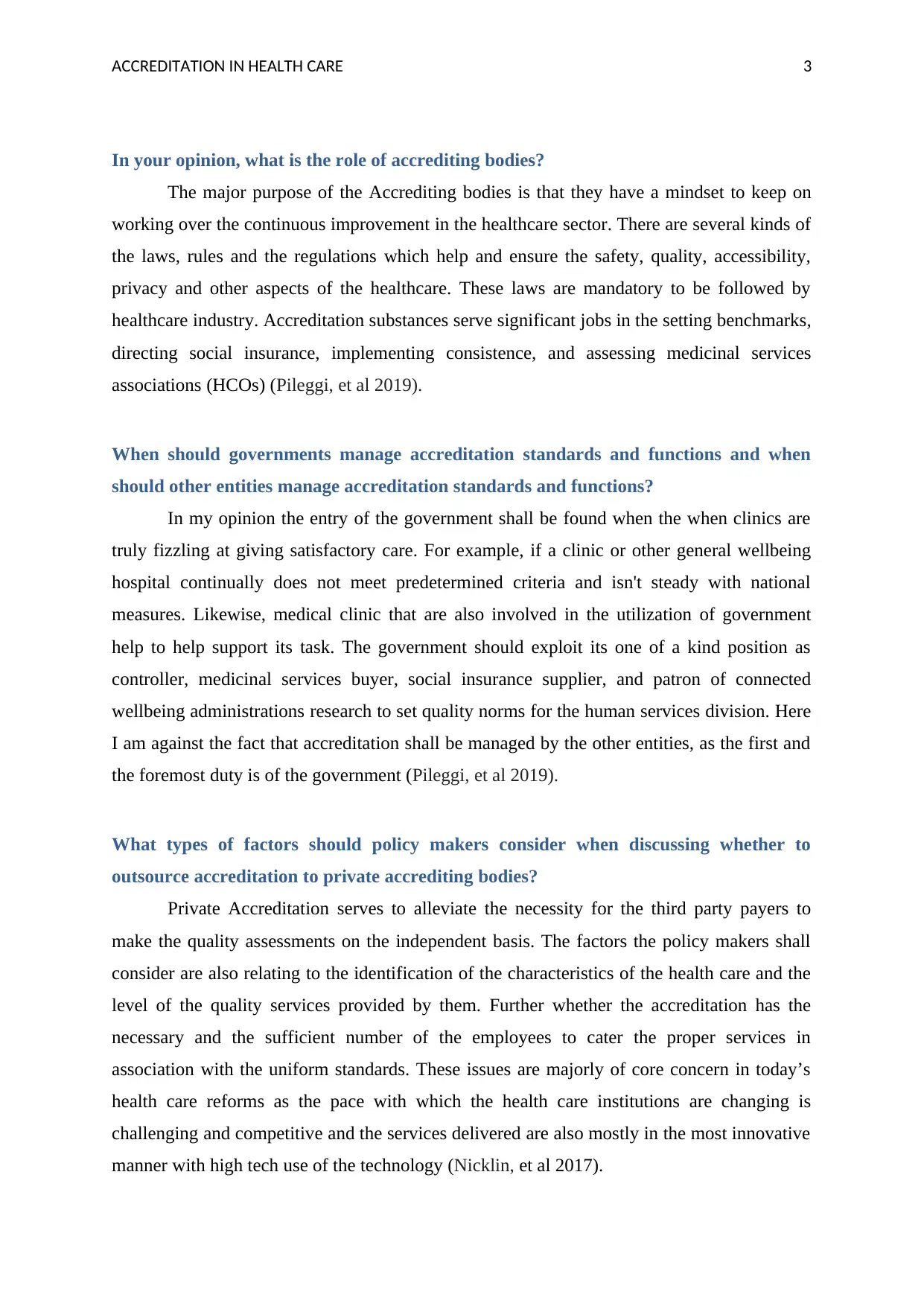
ACCREDITATION IN HEALTH CARE 3
In your opinion, what is the role of accrediting bodies?
The major purpose of the Accrediting bodies is that they have a mindset to keep on
working over the continuous improvement in the healthcare sector. There are several kinds of
the laws, rules and the regulations which help and ensure the safety, quality, accessibility,
privacy and other aspects of the healthcare. These laws are mandatory to be followed by
healthcare industry. Accreditation substances serve significant jobs in the setting benchmarks,
directing social insurance, implementing consistence, and assessing medicinal services
associations (HCOs) (Pileggi, et al 2019).
When should governments manage accreditation standards and functions and when
should other entities manage accreditation standards and functions?
In my opinion the entry of the government shall be found when the when clinics are
truly fizzling at giving satisfactory care. For example, if a clinic or other general wellbeing
hospital continually does not meet predetermined criteria and isn't steady with national
measures. Likewise, medical clinic that are also involved in the utilization of government
help to help support its task. The government should exploit its one of a kind position as
controller, medicinal services buyer, social insurance supplier, and patron of connected
wellbeing administrations research to set quality norms for the human services division. Here
I am against the fact that accreditation shall be managed by the other entities, as the first and
the foremost duty is of the government (Pileggi, et al 2019).
What types of factors should policy makers consider when discussing whether to
outsource accreditation to private accrediting bodies?
Private Accreditation serves to alleviate the necessity for the third party payers to
make the quality assessments on the independent basis. The factors the policy makers shall
consider are also relating to the identification of the characteristics of the health care and the
level of the quality services provided by them. Further whether the accreditation has the
necessary and the sufficient number of the employees to cater the proper services in
association with the uniform standards. These issues are majorly of core concern in today’s
health care reforms as the pace with which the health care institutions are changing is
challenging and competitive and the services delivered are also mostly in the most innovative
manner with high tech use of the technology (Nicklin, et al 2017).
In your opinion, what is the role of accrediting bodies?
The major purpose of the Accrediting bodies is that they have a mindset to keep on
working over the continuous improvement in the healthcare sector. There are several kinds of
the laws, rules and the regulations which help and ensure the safety, quality, accessibility,
privacy and other aspects of the healthcare. These laws are mandatory to be followed by
healthcare industry. Accreditation substances serve significant jobs in the setting benchmarks,
directing social insurance, implementing consistence, and assessing medicinal services
associations (HCOs) (Pileggi, et al 2019).
When should governments manage accreditation standards and functions and when
should other entities manage accreditation standards and functions?
In my opinion the entry of the government shall be found when the when clinics are
truly fizzling at giving satisfactory care. For example, if a clinic or other general wellbeing
hospital continually does not meet predetermined criteria and isn't steady with national
measures. Likewise, medical clinic that are also involved in the utilization of government
help to help support its task. The government should exploit its one of a kind position as
controller, medicinal services buyer, social insurance supplier, and patron of connected
wellbeing administrations research to set quality norms for the human services division. Here
I am against the fact that accreditation shall be managed by the other entities, as the first and
the foremost duty is of the government (Pileggi, et al 2019).
What types of factors should policy makers consider when discussing whether to
outsource accreditation to private accrediting bodies?
Private Accreditation serves to alleviate the necessity for the third party payers to
make the quality assessments on the independent basis. The factors the policy makers shall
consider are also relating to the identification of the characteristics of the health care and the
level of the quality services provided by them. Further whether the accreditation has the
necessary and the sufficient number of the employees to cater the proper services in
association with the uniform standards. These issues are majorly of core concern in today’s
health care reforms as the pace with which the health care institutions are changing is
challenging and competitive and the services delivered are also mostly in the most innovative
manner with high tech use of the technology (Nicklin, et al 2017).
⊘ This is a preview!⊘
Do you want full access?
Subscribe today to unlock all pages.

Trusted by 1+ million students worldwide
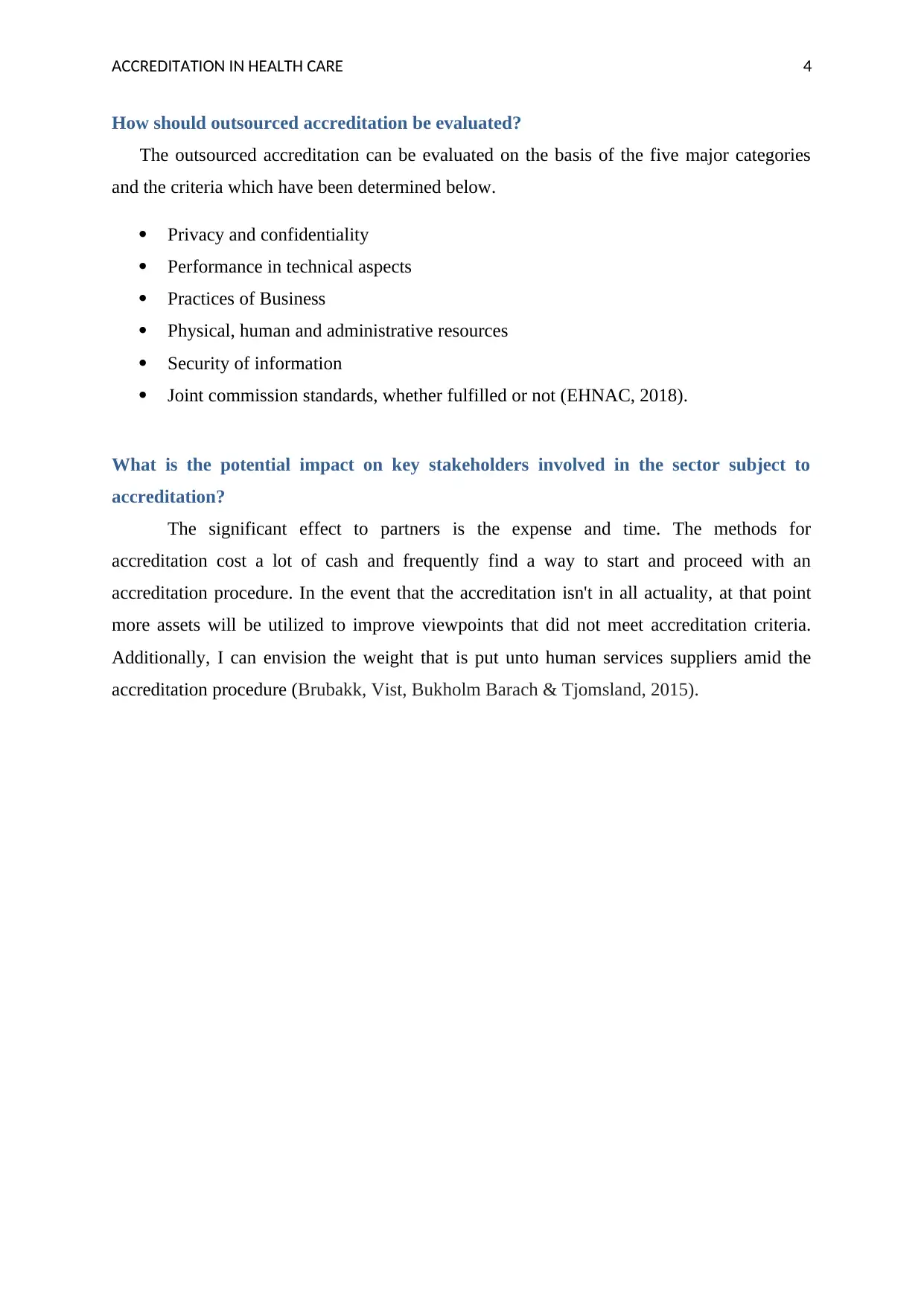
ACCREDITATION IN HEALTH CARE 4
How should outsourced accreditation be evaluated?
The outsourced accreditation can be evaluated on the basis of the five major categories
and the criteria which have been determined below.
Privacy and confidentiality
Performance in technical aspects
Practices of Business
Physical, human and administrative resources
Security of information
Joint commission standards, whether fulfilled or not (EHNAC, 2018).
What is the potential impact on key stakeholders involved in the sector subject to
accreditation?
The significant effect to partners is the expense and time. The methods for
accreditation cost a lot of cash and frequently find a way to start and proceed with an
accreditation procedure. In the event that the accreditation isn't in all actuality, at that point
more assets will be utilized to improve viewpoints that did not meet accreditation criteria.
Additionally, I can envision the weight that is put unto human services suppliers amid the
accreditation procedure (Brubakk, Vist, Bukholm Barach & Tjomsland, 2015).
How should outsourced accreditation be evaluated?
The outsourced accreditation can be evaluated on the basis of the five major categories
and the criteria which have been determined below.
Privacy and confidentiality
Performance in technical aspects
Practices of Business
Physical, human and administrative resources
Security of information
Joint commission standards, whether fulfilled or not (EHNAC, 2018).
What is the potential impact on key stakeholders involved in the sector subject to
accreditation?
The significant effect to partners is the expense and time. The methods for
accreditation cost a lot of cash and frequently find a way to start and proceed with an
accreditation procedure. In the event that the accreditation isn't in all actuality, at that point
more assets will be utilized to improve viewpoints that did not meet accreditation criteria.
Additionally, I can envision the weight that is put unto human services suppliers amid the
accreditation procedure (Brubakk, Vist, Bukholm Barach & Tjomsland, 2015).
Paraphrase This Document
Need a fresh take? Get an instant paraphrase of this document with our AI Paraphraser
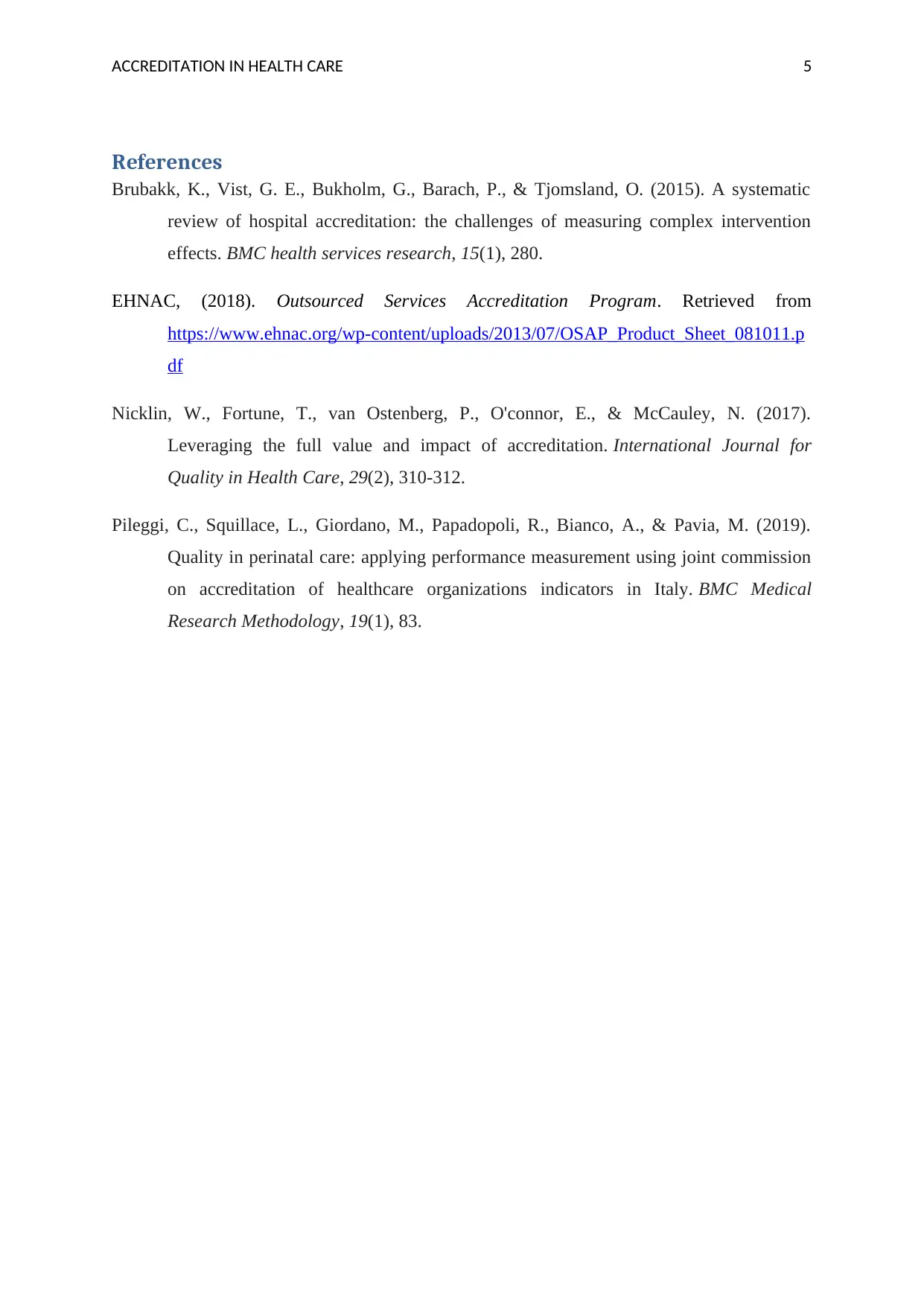
ACCREDITATION IN HEALTH CARE 5
References
Brubakk, K., Vist, G. E., Bukholm, G., Barach, P., & Tjomsland, O. (2015). A systematic
review of hospital accreditation: the challenges of measuring complex intervention
effects. BMC health services research, 15(1), 280.
EHNAC, (2018). Outsourced Services Accreditation Program. Retrieved from
https://www.ehnac.org/wp-content/uploads/2013/07/OSAP_Product_Sheet_081011.p
df
Nicklin, W., Fortune, T., van Ostenberg, P., O'connor, E., & McCauley, N. (2017).
Leveraging the full value and impact of accreditation. International Journal for
Quality in Health Care, 29(2), 310-312.
Pileggi, C., Squillace, L., Giordano, M., Papadopoli, R., Bianco, A., & Pavia, M. (2019).
Quality in perinatal care: applying performance measurement using joint commission
on accreditation of healthcare organizations indicators in Italy. BMC Medical
Research Methodology, 19(1), 83.
References
Brubakk, K., Vist, G. E., Bukholm, G., Barach, P., & Tjomsland, O. (2015). A systematic
review of hospital accreditation: the challenges of measuring complex intervention
effects. BMC health services research, 15(1), 280.
EHNAC, (2018). Outsourced Services Accreditation Program. Retrieved from
https://www.ehnac.org/wp-content/uploads/2013/07/OSAP_Product_Sheet_081011.p
df
Nicklin, W., Fortune, T., van Ostenberg, P., O'connor, E., & McCauley, N. (2017).
Leveraging the full value and impact of accreditation. International Journal for
Quality in Health Care, 29(2), 310-312.
Pileggi, C., Squillace, L., Giordano, M., Papadopoli, R., Bianco, A., & Pavia, M. (2019).
Quality in perinatal care: applying performance measurement using joint commission
on accreditation of healthcare organizations indicators in Italy. BMC Medical
Research Methodology, 19(1), 83.
1 out of 5
Related Documents
Your All-in-One AI-Powered Toolkit for Academic Success.
+13062052269
info@desklib.com
Available 24*7 on WhatsApp / Email
![[object Object]](/_next/static/media/star-bottom.7253800d.svg)
Unlock your academic potential
Copyright © 2020–2026 A2Z Services. All Rights Reserved. Developed and managed by ZUCOL.




